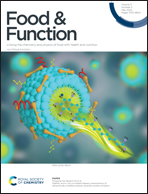Characterization of an antibacterial dodecapeptide from pig as a potential food preservative and its antibacterial mechanism
Abstract
Antimicrobial peptides are believed to be promising bio-preservatives to prevent microbial spoilage through food processing and preservation. With the aim of developing short peptides with broad-spectrum antimicrobial activity and revealing their potential antimicrobial mechanism, a novel class of dodecapeptides were designed by introducing Trp into the hydrophilic face of RI12, a truncated α-helical peptide of porcine myeloid antimicrobial peptide-36 (PMAP-36). The antimicrobial activity study indicated that Trp endowed the peptides with higher antimicrobial potency, and the net charge of +5 was sufficient for the dodecapeptides to exert antimicrobial action. Taking hemolytic activity into consideration, the most promising peptide RI12[K3W] (RLWKIGKVLKWI-NH2) was screened with high antimicrobial activity and non-toxicity. The antimicrobial mechanism study revealed that RI12[K3W] possessed the ability to bind to LPS components and enhance membrane permeability, which was verified by membrane penetration assays. Flow cytometry and electron microscopy further confirmed that RI12[K3W] killed bacterial cells primarily by membrane damage. The results guide the potential application of antimicrobial peptides in the food industry as food preservatives to prevent bacterial contamination.



 Please wait while we load your content...
Please wait while we load your content...